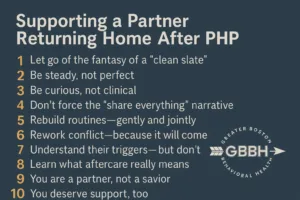They’re home. The treatment center doors closed behind them. And now, it’s your front door that matters.
For weeks—maybe longer—they’ve been in a structured environment, learning how to feel without falling apart, talking to strangers in group sessions, and showing up for themselves in ways you probably hoped for… and worried might never come.
Now they’re back. And everything is different. Or nothing is. Or maybe you can’t quite tell yet.
If you’re the partner or spouse of someone returning from a Partial Hospitalization Program (PHP), this guide is for you. Because reintegration isn’t just about getting your loved one back—it’s about rediscovering how to love each other, safely, after something big has shifted.
1. Let Go of the Fantasy of a “Clean Slate”
The truth is: your loved one didn’t just go away to get “fixed.”
They went to learn how to live better. To navigate hard emotions without self-destruction. To build healthier responses. Maybe to start medication. Maybe to feel again after numbing for years.
What they didn’t do? Press a reset button.
You might want to believe the hard part is over. You might hope things snap back into place. But reintegration is rarely instant. PHP provides momentum—what happens next takes time, repetition, and relational trust.
2. Be Steady, Not Perfect
Your job isn’t to be their rock. It’s to be steady enough that they don’t feel like they’re walking on eggshells.
You’re allowed to feel unsure. You’re allowed to be tired. You can miss how things were and still support how things are.
PHP was intensive. But coming home from PHP? That’s the long game. That’s where new patterns get tested. That’s where fear can creep back in—on both sides.
You don’t have to know exactly what to do. You just have to keep showing up.
3. Be Curious, Not Clinical
They’ve just spent weeks unpacking the most painful or confusing parts of themselves. That’s intimate. And exhausting.
Resist the urge to check in like a therapist. Don’t make every dinner conversation a progress report.
Instead, stay curious. Try:
- “What part of today felt manageable?”
- “Want to share something you’re proud of, or something that felt hard?”
- “Is there something you wish I understood better about this?”
The goal isn’t surveillance—it’s trust.
4. Don’t Force the “Share Everything” Narrative
People in recovery often need space to process internally before they can articulate it outwardly—especially with the people closest to them.
You may be their person. But that doesn’t mean you get every detail.
Try to respect the privacy they may still need—about group dynamics, about their thoughts, about their fears. Just because they love you doesn’t mean they owe you every disclosure.
Sometimes love means letting them keep things sacred.
5. Rebuild Routines—Gently and Jointly
One of the hardest things post-PHP is transitioning out of the daily structure. Waking up with no agenda after weeks of predictable treatment can feel disorienting or even dangerous.
Help them build rhythm without rigidity.
- Morning coffee together
- A walk after dinner
- Screen-free Sundays
- Grocery shopping as a team
You’re not reimposing order—you’re helping create grounding rituals that say: this is what care looks like now.
6. Rework Conflict—Because It Will Come
Conflict after PHP is inevitable. But the goal isn’t to avoid it—it’s to navigate it differently.
Try these basics:
- Use “I” language: “I feel distant when we don’t talk, not ‘you never talk to me.’”
- Avoid sarcasm or silence as weapons.
- Don’t threaten separation unless you mean it.
- End hard conversations with something soft—“I still love you,” even if you’re angry.
Their recovery is about more than self-regulation—it’s about how you both co-regulate now.
7. Understand Their Triggers—But Don’t Baby Them
Triggers are real. So is responsibility.
Your partner may need you to avoid certain topics, environments, or behaviors—at least for now. That’s okay. Accommodate within reason.
But you’re not there to prevent all discomfort. Discomfort is part of healing.
Offer support—but allow them the dignity of practicing the tools they learned in PHP.
8. Learn What Aftercare Really Means
PHP was not the final step. It was a pivot point.
Your loved one might now be doing:
- Intensive outpatient (IOP)
- Weekly therapy
- Medication management
- Support groups (AA, NA, SMART Recovery, etc.)
Learn the lingo. Ask what they need to stay connected to care. Encourage consistency.
And remember: their aftercare plan isn’t your checklist—it’s theirs.
9. You Are a Partner, Not a Savior
It’s tempting to want to make everything okay again. To make up for the pain, the silence, the distance PHP may have highlighted.
But you can’t recover for them.
You can be a witness. You can be a soft place. But don’t take on their work. That’s theirs to do—and yours to believe they can do.
10. You Deserve Support, Too
This was never a one-person experience. Even if only one of you was in PHP, the emotional toll, the hope, the exhaustion—you felt it too.
Find your own version of care:
- Individual therapy
- A support group for partners (Al-Anon, Codependents Anonymous)
- Journaling or somatic work
- Connection with friends who don’t expect you to have it all together
You deserve healing, just as much as they do.
FAQs: For Partners After PHP
What if I don’t trust them yet?
That’s okay. Trust isn’t an on/off switch—it’s a process. Let their actions guide your openness, not just their words.
Is it okay to talk about the past?
Yes—but only when it’s rooted in healing, not shaming. Ask if it’s a good time. Frame it as: “Can we process something that’s been on my mind?”
How do I know if relapse is happening?
Watch for:
- Increased isolation
- Avoiding therapy or support
- Mood swings or emotional shutdown
- Lying about small things
But don’t assume. Ask gently. “Are you okay? Something feels different.”
What if they stop following through with aftercare?
Bring it up without blame. “I know this stuff is hard, but I’m worried. Is there something making it feel impossible right now?”
Can we have sex again?
Only when it feels emotionally safe for both of you. If past pain has been tangled up in intimacy, take it slow. Let trust, not tension, lead.
Reintegration after PHP isn’t about perfection. It’s about grace.
Your partner is relearning how to live without defaulting to self-protection or self-destruction. And you’re relearning how to love them as they change—sometimes slowly, sometimes radically. There’s grief in this. And beauty. And moments of staggering closeness when you both realize: we’re doing it—we’re trying. Hold space. Hold each other. And when you need help—reach out. If you’re near Boston, Dedham, Waltham, Needham, or West Roxbury, Massachusetts, GBBH offers programs with that same approach.
Ready to rebuild a new rhythm together?
Call (888) 450‑3097 or visit Greater Boston Behavioral Health’s PHP program to learn how we support couples navigating recovery—side by side.


